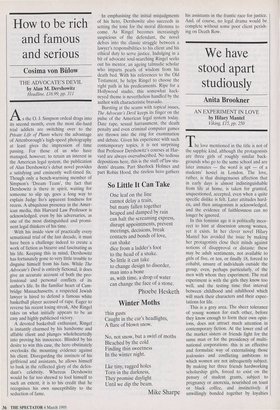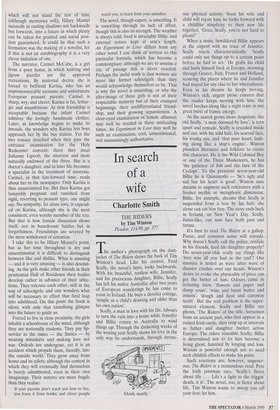We have stood apart studiously
Anita Brookner
AN EXPERIMENT IN LOVE by Hilary Mantel Viking, .£15, pp. 250 The love mentioned in the title is not of the sapphic kind, although the protagonists are three girls of roughly similar back- grounds who go to the same school and are later inmates — the word is apt — of a students' hostel in London. The love, rather, is that disingenuous affection that in early days is almost indistinguishable from life at home, is taken for granted, unquestioned, accepted, even when a quite specific dislike is felt. Later attitudes hard- en, and then antagonism is acknowledged, and the evidence of faithlessness can no longer be ignored.
In this feminist age it is politically incor- rect to hint at dissension among women, yet it exists. In her clever novel Hilary Mantel has avoided the issue by making her protagonists close their minds against notions of disapproval or distaste: these may be adult sentiments, not available to girls of five, or ten, or finally 18, forced to cohabit, unsure of individuals outside the group, even, perhaps particularly, of the men with whom they experiment. The real experiment is with the girls they know too well, and the testing time that interval between childhood and adulthood which will mark their characters and their expec- tations for life.
This is a grey area. The sheer tolerance of young women for each other, before they know enough to form their own opin- ions, does not attract much attention in contemporary fiction. At the lower end of the market sisters or friends fight for the same man or for the presidency of multi- national corporations: this is an effective and formulaic way of externalising those jealousies and conflicting ambitions to which women are not infrequently subject. By making her three friends hardworking scholarship girls, forced to exist on the penury of student grants, subject to pregnancy or anorexia, nourished on toast or black coffee, and instinctively if unwillingly bonded together by loyalties which will not stand the test of time (although memories will), Hilary Mantel succeeds in casting shadows not backwards but forwards, into a future in which plenty Can be taken for granted and social posi- tion guaranteed. It could be that such a formation was the making of a novelist, for if this is not an autobiography it is a very clever imitation of one.
The narrator, Carmel McCabe, is a girl from a poor home, in which knitting and jigsaw puzzles are the approved recreations. By maternal decree she is forced to befriend Karina, who has an unpronounceable surname and unfortunate European peasant parents. Carmel is sharp, wry, and clever; Karina is fat, lethar- gic and unambitious. At first friendship is acceptable because the infant Carmel admires the lovingly handmade clothes. Later, as knowledge begins to make its inroads, she wonders why Karina lets boys approach her by the bus station. Yet the two remain attached when they pass the entrance examination for the Holy Redeemer convent; there they meet Julianne Lipcott, the smartest and most naturally endowed of the three. She is a doctor's daughter, and in later life becomes a specialist in the treatment of anorexia. Carmel, in that fast-forward time, reads about her in the newspaper. Only Karina is thus unaccounted for. But then Karina got lumpishly pregnant and vanished from sight, reverting to peasant type, one might say. No sympathy, let alone love, is expend- ed on Karina, although she is the most consistent, even worthy member of the trio. But that is how female dissension shows itself, not in boardroom battles but in forgetfulness. Friendships are severed by the mere withdrawal of attention.
I take this to be Hilary Mantel's point, but as her tone throughout is dry and unsentimental it is difficult to distinguish between like and dislike. What is amusing — and it is very amusing — is also desolat- ing. As the girls make other friends in their penitential Hall of Residence their bodies develop rather in advance of their affec- tions. They tolerate each other, still in the way of schoolgirls, and one wonders what will be necessary to effect that final leap into adulthood. On this point the book is silent, with only that tantalising glimpse into the future to guide us.
Forced to live in close proximity, the girls inhabit a schoolroom of the mind, although they are notionally students. They pay lip- service to the times — the Sixties — by wearing miniskirts and making love not war. Ordeals are undergone, yet it is an accident which propels them, literally, into the outside world. They grow away from home and its edicts, although the context in which they will eventually find themselves is barely adumbrated, even in their own imaginings. Their natures are more fragile than they realise:
If your parents don't teach you how to live, you learn it from books; and clever people watch you, to learn from your mistakes.
The novel, though expert, is unsettling. It is unsettling through its lack of affect, though this is also its strength. The weather is always cold, food is invariably filthy, and external nature kept at arm's length. An Experiment in Love differs from any other novel I can think of written to this particular formula, which has become a commonplace: although we are to assume a rite of passage this is never enacted. Perhaps the awful truth is that women are more like former schoolgirls than they would acknowledge themselves to be. That is why the novel is unsettling, or why the after-image of these girls is not of their respectable maturity but of their cramped beginnings, their undifferentiated friend- ship, and their growing separateness. A clear-eyed examination of female alliances may well be needed in these misleading times. An Experiment in Love may well be such an examination, cool, unsentimental, and unassumingly authoritative.



























































 Previous page
Previous page